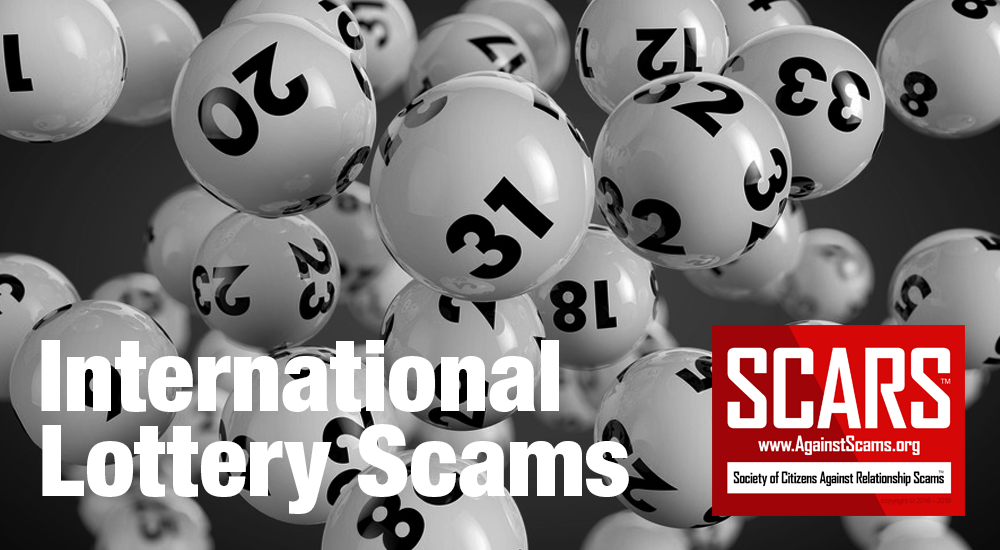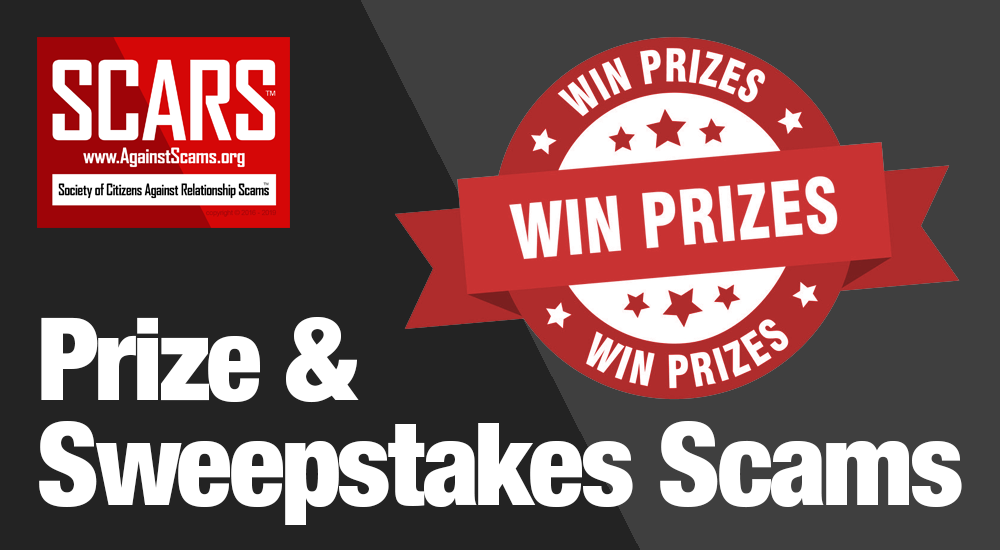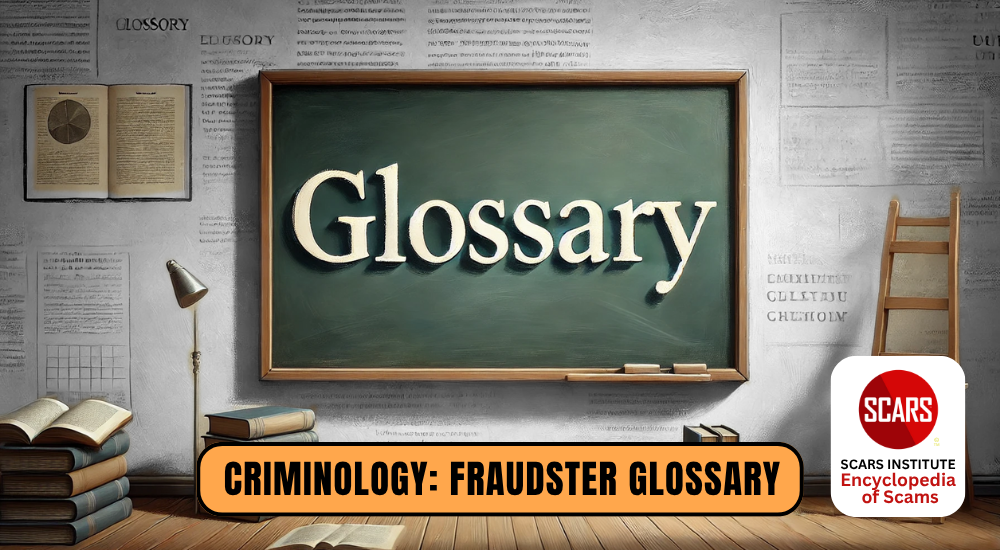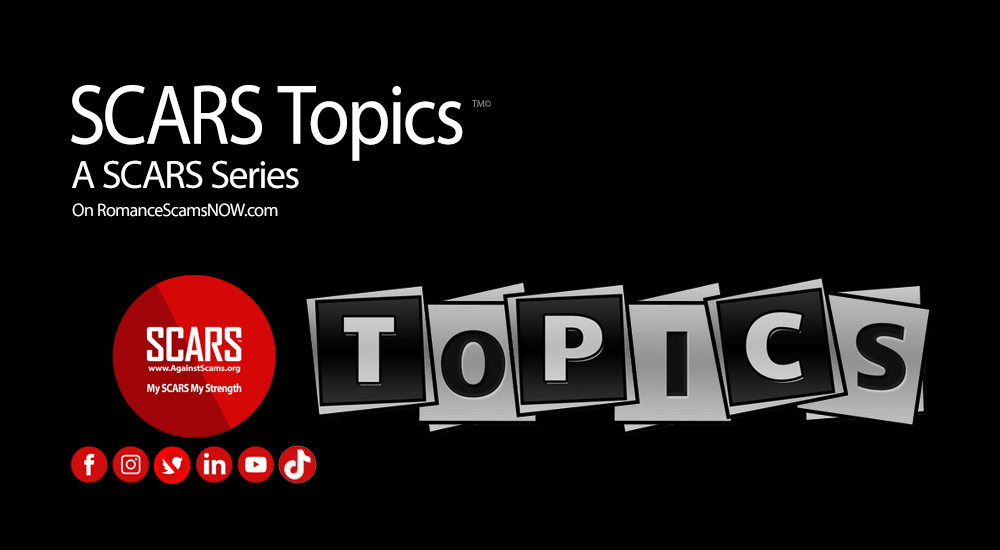
SCARS Institute’s Encyclopedia of Scams™ Published Continuously for 25 Years

SCARS™ Special Report: Prize & Sweepstakes Scams
You’ve just won $5,000! Or $5 million. Or maybe it’s a fabulous diamond ring, or luxury vacation? More likely, it’s a prize scam, and you’ll find the prize isn’t worth much — if you get a prize at all. Here’s one way to think about it: if you have to pay, it’s not a prize.
About Contests and Prizes
Who doesn’t want to win something? But before you drop in a quick entry or follow instructions to claim a prize, here are a few things to know:
Legitimate Sweepstakes Are Free And By Chance
It’s illegal to ask you to pay or buy something to enter or increase your odds of winning.
Prize Promoters Might Sell Your Information To Advertisers
When you sign up for a contest or drawing, you probably will get more promotional mail, telemarketing calls, or spam email instead of a prize.
Prize Promoters Have To Tell You Certain Things
Telemarketers are legally required to tell you the odds of winning, the nature or value of the prizes, that entering is free, and the terms and conditions to redeem a prize. Sweepstakes mailings also must tell you that you don’t have to pay to participate. They also can’t claim that you’re a winner unless you’ve actually won a prize. And they’re not legally permitted to include fake checks that don’t clearly state they’re non-negotiable and have no cash value.
Signs of a Prize Scam
Plenty of contests are run by reputable marketers and non-profits. But every day, people lose thousands of dollars to prize scams. Here are some signs you’re dealing with a scam:
You Have To Pay
Legitimate sweepstakes don’t make you pay a fee or buy something to enter or improve your chances of winning — that includes paying “taxes,” “shipping and handling charges,” or “processing fees” to get your prize. There’s also no reason to give someone your checking account number or credit card number in response to a sweepstakes promotion.
A skills contest where you do things like solve problems or answer questions correctly can ask you to pay. But these contests also tend to get more difficult and expensive as you advance, leaving contestants with nothing to show for their money and effort.
You Have To Wire Money
You may be told to wire money to an agent of “Lloyd’s of London” or another well-known company — often in a foreign country — to “insure” delivery of the prize. Don’t do it. Wiring money is like sending cash: once it’s gone, you can’t trace it or get it back. The same goes for sending a check or money order by overnight delivery or courier, or putting money on a prepaid debit card.
You Have To Deposit A Check They’ve Sent To You
When you do, they’ll ask you to wire a portion of the money back. The check will turn out to be a fake, and you will owe the bank any money you withdrew.
You’Re Told They’re From The Government — Or Another Organization With A Name That Sounds Official
They might say they’re from an agency like the Federal Trade Commission and are informing you that you’ve won a federally supervised lottery or sweepstakes. Or they might use an official-sounding name like “the national consumer protection agency” or the non-existent “National Sweepstakes Bureau.” But they’re imposters. The FTC doesn’t oversee sweepstakes, and no federal government agency or legitimate sweepstakes company will contact you to ask for money so you can claim a prize.
Other scammers might pretend to be a company like Publishers Clearing House or Reader’s Digest, which run legitimate sweepstakes. Look for signs of a scam, but if you’re still unsure, contact the real companies to find out the truth.
Your “Notice” Was Mailed By Bulk Rate Postage
It’s not likely you’ve won a big prize if your notification was mailed by bulk rate. Other people got the same notice, too. Check the postmark on the envelope or postcard. Do you even remember entering? If not, odds are you didn’t.
You Have To Attend A Sales Meeting To Win
If you agree to attend, you’re likely to endure a high-pressure sales pitch. In fact, any pressure to “act now” before you miss out on a prize is a sign of a scam.
You Get A Call Out Of The Blue, Even Though You’re On The Do Not Call Registry
Once you register your phone number for free at donotcall.gov, unwanted telemarketing calls should stop within 30 days. Unless the company falls under one of the exemptions, it shouldn’t be calling: it’s illegal.
Foreign Lotteries
Sometimes a letter you get will say you’ve won a foreign lottery or sweepstakes. Typically, the letter will include a check. This is a fake check scam. Or a letter will say they’re offering you a chance to enter a foreign lottery. The truth is that, even if your name was entered, it’s illegal to play a foreign lottery.
Text Message Prize Offers
You get a text message that says you’ve won a gift card or other free prize. When you go to the website and enter your personal information, you’ll also be asked to sign up for “trial offers” — offers that leave you with recurring monthly charges. Worse, the spammer could sell your information to identity thieves.
When you see a spam text offering a gift, gift card, or free service, report it to your carrier, then delete it. Don’t reply or click on any links; often, they install malware on your computer and take you to spoof sites that look real but are in business to steal your information.
Check Them Out
Scammers don’t obey the law. To avoid a scam, you have to do some research. If you’re not sure about a contest or promoter, try typing the company or product name into your favorite search engine with terms like “review,” “complaint” or “scam.” You also might check it out with your state attorney general or local consumer protection office.
Keep in mind that many questionable prize promotion companies don’t stay in one place long enough to establish a track record, so if no complaints come up, it’s no guarantee that the offer is real.
TAGS: SCARS, Important Article, Information About Scams, Anti-Scam, Scams, Scammers, Fraudsters, Cybercrime, Crybercriminals, Scam Victims, Prize Scams, Sweepstakes Scams, Win Money Scams
SCARS™ Editorial Team
Society of Citizens Against Relationship Scams Inc.
A Worldwide Crime Victims Assistance Nonprofit Organization
Visit: www.AgainstScams.org
Contact Us: Contact@AgainstScams.org
PLEASE SHARE OUR ARTICLES WITH YOUR FRIENDS & FAMILY
HELP OTHERS STAY SAFE ONLINE – YOUR KNOWLEDGE CAN MAKE THE DIFFERENCE!
The Latest SCARS Posts:
FIND MORE SCAM NEWS
«SCAMCRIME.COM»
JOIN US ON FACEBOOK
«CLICK HERE»
END
MORE INFORMATION
– – –
Tell us about your experiences with Romance Scammers in our
« Scams Discussion Forum on Facebook »
– – –
FAQ: How Do You Properly Report Scammers?
It is essential that law enforcement knows about scams & scammers, even though there is nothing (in most cases) that they can do.
Always report scams involving money lost or where you received money to:
- Local Police – ask them to take an “informational” police report – say you need it for your insurance
- U.S. State Police (if you live in the U.S.) – they will take the matter more seriously and provide you with more help than local police
- Your National Police or FBI « www.IC3.gov »
- The SCARS|CDN™ Cybercriminal Data Network – Worldwide Reporting Network on « www.Anyscam.com »
This helps your government understand the problem, and allows law enforcement to add scammers on watch lists worldwide.
– – –
To learn more about SCARS visit « www.AgainstScams.org »
Please be sure to report all scammers
on « www.Anyscam.com »
Disclaimer:
SCARS IS A DIGITAL PUBLISHER AND DOES NOT OFFER HEALTH OR MEDICAL ADVICE, LEGAL ADVICE, FINANCIAL ADVICE, OR SERVICES THAT SCARS IS NOT LICENSED OR REGISTERED TO PERFORM.
IF YOU’RE FACING A MEDICAL EMERGENCY, CALL YOUR LOCAL EMERGENCY SERVICES IMMEDIATELY, OR VISIT THE NEAREST EMERGENCY ROOM OR URGENT CARE CENTER. YOU SHOULD CONSULT YOUR HEALTHCARE PROVIDER BEFORE FOLLOWING ANY MEDICALLY RELATED INFORMATION PRESENTED ON OUR PAGES.
ALWAYS CONSULT A LICENSED ATTORNEY FOR ANY ADVICE REGARDING LEGAL MATTERS.
A LICENSED FINANCIAL OR TAX PROFESSIONAL SHOULD BE CONSULTED BEFORE ACTING ON ANY INFORMATION RELATING TO YOUR PERSONAL FINANCES OR TAX RELATED ISSUES AND INFORMATION.
This content and other material contained on the website, apps, newsletter, and products (“Content”), is general in nature and for informational purposes only and does not constitute medical, legal, or financial advice; the Content is not intended to be a substitute for licensed or regulated professional advice. Always consult your doctor or other qualified healthcare provider, lawyer, financial or tax professional with any questions you may have regarding the educational information contained herein. SCARS makes no guarantees about the efficacy of information described on or in SCARS’s Content. The information contained are subject to change and are not intended to cover all possible situations or effects. SCARS does not recommend or endorse any specific professional or care provider, product, service, or other information that may be mentioned in SCARS’s websites, apps, and Content unless explicitly identified as such.
The disclaimers herein are provided on this page for ease of reference. These disclaimers supplement and are a part of SCARS’s websites Terms of Use.
Legal Notices:
All original content is Copyright © 1991 – 2020 Society of Citizens Against Relationship Scams Inc. (D.B.A SCARS) All Rights Reserved Worldwide & Webwide. Third-party copyrights acknowledge.
SCARS, SCARS|INTERNATIONAL, SCARS, SCARS|SUPPORT, SCARS, RSN, Romance Scams Now, SCARS|WORLDWIDE, SCARS|GLOBAL, SCARS, Society of Citizens Against Relationship Scams, Society of Citizens Against Romance Scams, SCARS|ANYSCAM, Project Anyscam, Anyscam, SCARS|GOFCH, GOFCH, SCARS|CHINA, SCARS|CDN, SCARS|UK, SCARS|LATINOAMERICA, SCARS|MEMBER, SCARS|VOLUNTEER, SCARS Cybercriminal Data Network, Cobalt Alert, Scam Victims Support Group, are all trademarks of Society of Citizens Against Relationship Scams Inc.
Contact the law firm for the Society of Citizens Against Relationship Scams Incorporated by email at legal@AgainstScams.org
-/ 30 /-
What do you think about this?
Please share your thoughts in a comment below!
Table of Contents
- About Contests and Prizes
- Signs of a Prize Scam
- Foreign Lotteries
- Text Message Prize Offers
- Check Them Out
- New U.S. Law – S.3643 – 118th Congress – Will Dramatically Impact Scammers and Terrorists – 2026
- How Scam Survivors Can Survive Valentine’s Day – 2026
- U.S. Veterans Benefits Scams – 2026
- New AI Voice Cloning Phone Scams – 2026
- An Essay on Justice and Money Recovery – 2026
- Virtual Kidnapping & Extortion – Proof of Life Images or Videos – 2026
LEAVE A COMMENT?
Recent Comments
On Other Articles
- SCARS Institute Editorial Team on Reporting Scams & Interacting With The Police – A Scam Victim’s Checklist [VIDEO]: “Yes, this is a scam. For your own sanity, just block them completely.” Feb 25, 15:37
- on Danielle Delaunay/Danielle Genevieve – Stolen Identity/Stolen Photos – Impersonation Victim UPDATED 2024: “She goes by the name of Sanrda John now” Feb 25, 10:26
- on Reporting Scams & Interacting With The Police – A Scam Victim’s Checklist [VIDEO]: “So far I have not been scam out of any money because I was aware not to give the money…” Feb 25, 07:46
- on Love Bombing And How Romance Scam Victims Are Forced To Feel: “I was love bombed to the point that I would do just about anything for the scammer(s). I was told…” Feb 11, 14:24
- on Dani Daniels (Kira Lee Orsag): Another Scammer’s Favorite: “You provide a valuable service! I wish more people knew about it!” Feb 10, 15:05
- on Danielle Delaunay/Danielle Genevieve – Stolen Identity/Stolen Photos – Impersonation Victim UPDATED 2024: “We highly recommend that you simply turn away form the scam and scammers, and focus on the development of a…” Feb 4, 19:47
- on The Art Of Deception: The Fundamental Principals Of Successful Deceptions – 2024: “I experienced many of the deceptive tactics that romance scammers use. I was told various stories of hardship and why…” Feb 4, 15:27
- on Danielle Delaunay/Danielle Genevieve – Stolen Identity/Stolen Photos – Impersonation Victim UPDATED 2024: “Yes, I’m in that exact situation also. “Danielle” has seriously scammed me for 3 years now. “She” (he) doesn’t know…” Feb 4, 14:58
- on An Essay on Justice and Money Recovery – 2026: “you are so right I accidentally clicked on online justice I signed an agreement for 12k upfront but cd only…” Feb 3, 08:16
- on The SCARS Institute Top 50 Celebrity Impersonation Scams – 2025: “Quora has had visits from scammers pretending to be Keanu Reeves and Paul McCartney in 2025 and 2026.” Jan 27, 17:45
ARTICLE META
Important Information for New Scam Victims
- Please visit www.ScamVictimsSupport.org – a SCARS Website for New Scam Victims & Sextortion Victims
- Enroll in FREE SCARS Scam Survivor’s School now at www.SCARSeducation.org
- Please visit www.ScamPsychology.org – to more fully understand the psychological concepts involved in scams and scam victim recovery
If you are looking for local trauma counselors please visit counseling.AgainstScams.org or join SCARS for our counseling/therapy benefit: membership.AgainstScams.org
If you need to speak with someone now, you can dial 988 or find phone numbers for crisis hotlines all around the world here: www.opencounseling.com/suicide-hotlines
A Note About Labeling!
We often use the term ‘scam victim’ in our articles, but this is a convenience to help those searching for information in search engines like Google. It is just a convenience and has no deeper meaning. If you have come through such an experience, YOU are a Survivor! It was not your fault. You are not alone! Axios!
A Question of Trust
At the SCARS Institute, we invite you to do your own research on the topics we speak about and publish, Our team investigates the subject being discussed, especially when it comes to understanding the scam victims-survivors experience. You can do Google searches but in many cases, you will have to wade through scientific papers and studies. However, remember that biases and perspectives matter and influence the outcome. Regardless, we encourage you to explore these topics as thoroughly as you can for your own awareness.
Statement About Victim Blaming
SCARS Institute articles examine different aspects of the scam victim experience, as well as those who may have been secondary victims. This work focuses on understanding victimization through the science of victimology, including common psychological and behavioral responses. The purpose is to help victims and survivors understand why these crimes occurred, reduce shame and self-blame, strengthen recovery programs and victim opportunities, and lower the risk of future victimization.
At times, these discussions may sound uncomfortable, overwhelming, or may be mistaken for blame. They are not. Scam victims are never blamed. Our goal is to explain the mechanisms of deception and the human responses that scammers exploit, and the processes that occur after the scam ends, so victims can better understand what happened to them and why it felt convincing at the time, and what the path looks like going forward.
Articles that address the psychology, neurology, physiology, and other characteristics of scams and the victim experience recognize that all people share cognitive and emotional traits that can be manipulated under the right conditions. These characteristics are not flaws. They are normal human functions that criminals deliberately exploit. Victims typically have little awareness of these mechanisms while a scam is unfolding and a very limited ability to control them. Awareness often comes only after the harm has occurred.
By explaining these processes, these articles help victims make sense of their experiences, understand common post-scam reactions, and identify ways to protect themselves moving forward. This knowledge supports recovery by replacing confusion and self-blame with clarity, context, and self-compassion.
Additional educational material on these topics is available at ScamPsychology.org – ScamsNOW.com and other SCARS Institute websites.
Psychology Disclaimer:
All articles about psychology and the human brain on this website are for information & education only
The information provided in this article is intended for educational and self-help purposes only and should not be construed as a substitute for professional therapy or counseling.
While any self-help techniques outlined herein may be beneficial for scam victims seeking to recover from their experience and move towards recovery, it is important to consult with a qualified mental health professional before initiating any course of action. Each individual’s experience and needs are unique, and what works for one person may not be suitable for another.
Additionally, any approach may not be appropriate for individuals with certain pre-existing mental health conditions or trauma histories. It is advisable to seek guidance from a licensed therapist or counselor who can provide personalized support, guidance, and treatment tailored to your specific needs.
If you are experiencing significant distress or emotional difficulties related to a scam or other traumatic event, please consult your doctor or mental health provider for appropriate care and support.
Also read our SCARS Institute Statement about Professional Care for Scam Victims – click here to go to our ScamsNOW.com website.























Thank you for your comment. You may receive an email to follow up. We never share your data with marketers.